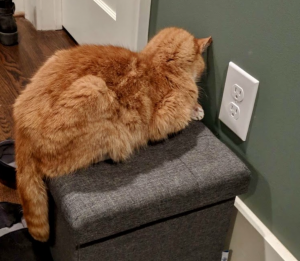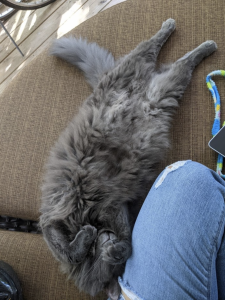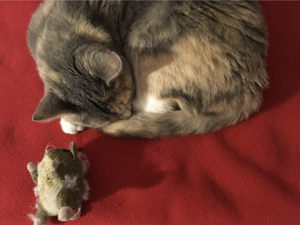Dealing with Failure Setbacks
By Elaine, a Writing Center Coach

I still remember the first time I got a “B” on a paper in college. My entire face heated up like I was sitting under a grow light, and I didn’t take in a single word from the lecture that day in PoliSci. After class, I called my mother to cry about it, but having watched me melt down every time I lost a soccer game throughout high school, she tried to remind me it wasn’t a big deal. Afterwards, I spent days convinced I was going to lose my scholarship. In the end, my mother was right. It’s fourteen years later, and I am here to report that the only reason I remember that grade is because it taught me how to use failure rather than dread it.
Failure looks different every semester and for every person, but I like to think the fundamentals are the same: failure sucks because we hope for something and we think we can get it. And then we don’t. For me, this semester has already been full of failure, which has led me to reflect on the coping strategies I’ve been using to keep myself engaged in my schoolwork. Years of failing have given me the invaluable ability to distinguish between my failures and my value as a human being. But it’s a tough process. That’s why my first strategy is really more of a stage:

Strategy 1: I let myself grieve. When I face failure that genuinely hurts me, I take the day off and sulk. Sometimes I name what I’m mourning (i.e., “I just wanted an A” “I thought I wouldn’t have to write another draft”), but I try not to judge myself for having big feelings even over something that seems small. Because at the heart of that something small was a hope, a dream that was diminished in a very real way.
Diminished but not destroyed. If the grief that follows failure indicates anything, it’s that you really want something. That’s why my next coping strategy is:
Strategy 2: I revise my dream. There’s a part in Disney’s Tangled when one of the main characters, Flynn Rider, describes his dream in life (to be rich and alone) and a friendly side character lets him know, “Your dream sucks.” It’s one of many turning points for the character when he realizes he’s worth a dream that is bigger and better than he first imagined. The same has been true for me after a failure. The failure can become a “setback” if I reassess the situation and shift course. Sometimes it’s a simple narrative shift, like “Instead of getting an A on everything easily and proving how effortlessly smart I am, I’m going to overcome adversity to get an A and prove how much grit I have.”
Other times, a failure forces me to recognize that my dream stunk because it wasn’t based on an accurate assessment of my abilities. For example, last spring, I took my PhD comprehensive exams. Like many other PhD students, my mental breakdown happened during the second question when I realized I was trying to write too much and incorporate too many ideas. The paper was in shambles, and I only had two days to correct my mistakes. The main thing I did was sharpen my focus and realize I don’t have the capacity to tie together eight different ideas in one paper in one week. My goal shifted from “Write the most amazing comps answer ever” – a dream I hadn’t realized I held until I mourned its passing – to “Finish an adequate comps answer.” With this shift, failure to achieve an unattainable goal turns into a setback on the way to a more reasonable endeavor.

In high-pressure situations, I don’t always have time for this next strategy, but in the day-to-day grind of the semester, I find it helpful:
Strategy 3: I do something easy, something small, or something satisfying. After really bad setbacks, sometimes the “something easy” is literally doing my laundry. I like to keep the bar low. Recently I had a paper rejected by an academic journal. It took months before I was ready to work on it again, but when I did, my to-do list for that day said, “Just read it. No fixing.” Sometimes the easy item leads immediately to an increase in motivation and a sudden, brilliantly clear pathway forward. Other times, I need an incentive. That’s my fourth strategy:
Strategy 4: I bribe myself. Writing and indeed all forms of academic labor are not glorious. Often, they’re not fun. So there’s no shame in a little bribery. For me, bribes usually consist of turning on a Premier League game and eating Doritos on the couch all afternoon. Another way to think of this strategy is self care. No matter the term, this strategy is about simultaneously striving for your best and accepting your reality.

for a hard day’s work
I had a horrible opportunity to practice each of these just recently: my computer froze when I was writing and somehow – somehow – in this unholy age of technological genius, micromanaging softwares, and constant surveillance, Microsoft Word shut down without backing up to OneDrive. I lost an hour’s worth of work on an application. Some of the best sentences I had ever written about my dissertation no longer existed.
First, I took time to grieve by swearing for about five minutes and then crying for another five minutes (Strategy 1). Then, I offered myself an incentive, a boost to get going again: if you work for one hour on recovering the words you lost (Strategy 3), I told myself, you can do whatever you want for the rest of the day (Strategy 4). Earlier I had been fine-tuning the language on the application, but I didn’t have that kind of energy anymore. So, I revised my dream (Strategy 2): instead of precision, I needed to write what Anne Lamotte calls a sloppy first draft. And I did.
My mid-semester setbacks break my academic heart every time. But that’s okay, because they destroy the crippling forces of perfectionism and fear. In that spirit, may we all fail frequently this semester, and, in doing so, transform our failures into setbacks on the way to something better.
This blog showcases the perspectives of UNC Chapel Hill community members learning and writing online. If you want to talk to a Writing and Learning Center coach about implementing strategies described in the blog, make an appointment with a writing coach, a peer tutor, or an academic coach today. Have an idea for a blog post about how you are learning and writing remotely? Contact us here.

